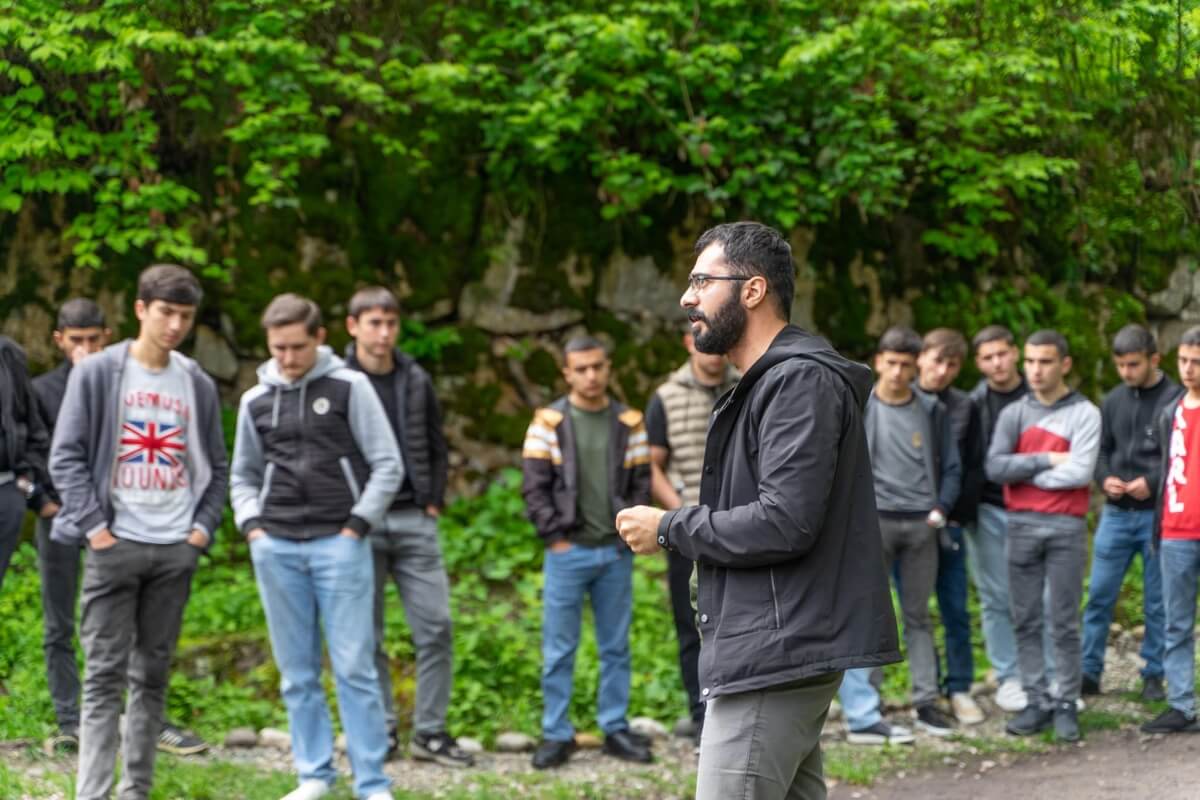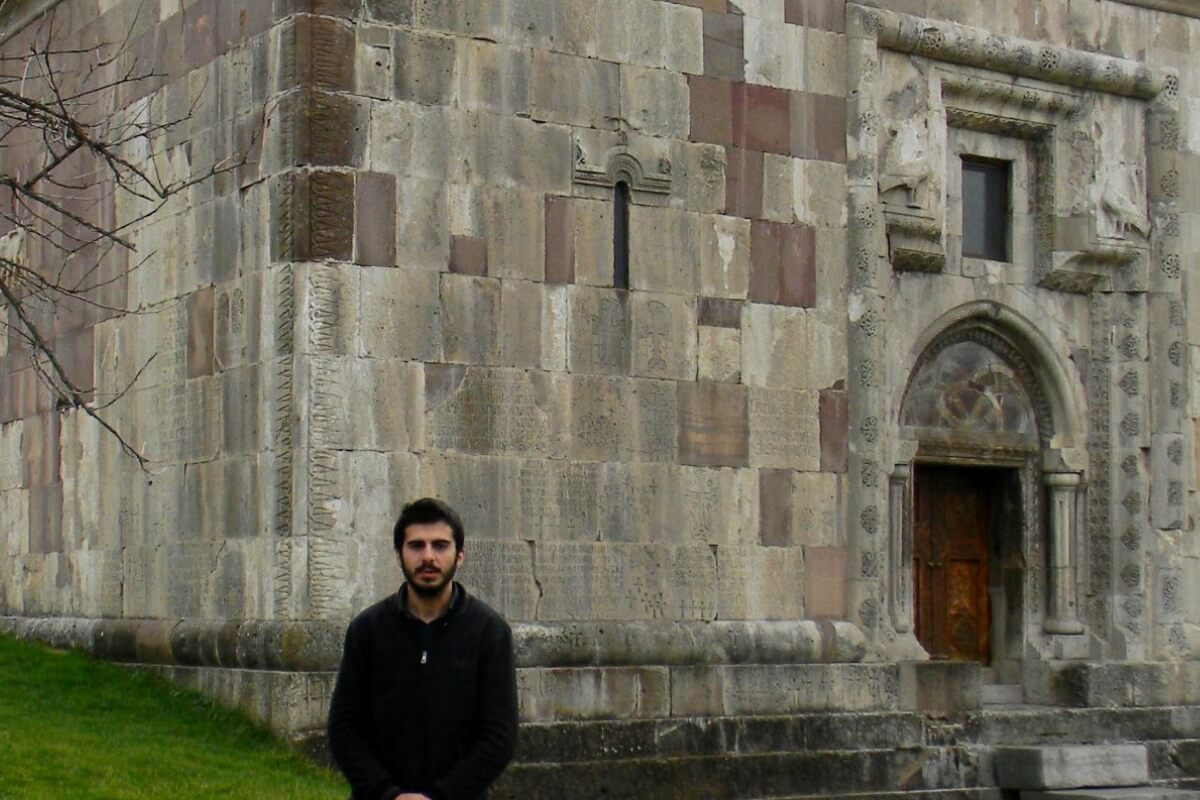My Road
19.07.2024
8 min read
Repat Story
The Ark Named ‘Armenia’: Where to Navigate to Find Safety
-webp(85)-o(jpg).webp?token=e530533d4291ced9a25c8cb6af746e26)
Living outside home, coming to study
Preparing for a meeting with Samvel Meliksetyan, with a friend with whom we experienced some part of life as diaspora Armenians, I tried to remember what our last meeting was like and what we talked about then. After another Sunday gathering in the New Nakhichevan Armenian community, we boarded bus number three and on the way home, standing in the middle of the bus, apparently hungry, we tried to figure out how to correctly say “pie” in Armenian. The correct answer “karkandak” came to us before I got off the bus. I said goodbye to Samvel at the intersection of two main streets of Rostov-on-Don. We continued this conversation 15 years later in Yerevan, being in the status of repatriates.
Samvel finally moved to Armenia in April 2022, but the journey of returning home began much earlier.
“I always had a desire to return to Armenia, since I moved to Russia when I was quite old. I was ten, the adaptation was quite difficult, I was used to something completely different. And in Armenia, I formed a fairly definite national identity, and this was also cultivated in my family. When my grandmother died in 2004, my father brought Soviet encyclopedias and history books to Vladikavkaz, and the craving for the homeland began to intensify, although it had always been there. In any environment I found something interesting, but I still felt like I was from another world. And when we came to Armenia in 2013 under the “Young Diaspora Journalists” program, there were representatives from Yerevan State University who announced the opportunity to study in the master’s program “Genocide Studies” with benefits for Armenians from the Diaspora. In Rostov-on-Don, I then entered the Southern Federal University to apply for a job, but came home with the words “That’s it, I’m leaving for Armenia.”
From 2013-2015 I studied in the master’s program, and then in the same year I entered Yerevan State University for a candidate’s degree. My dialect language then opened up, it was a very useful experience. But I had a personal crisis, I was not ready for many things, my perception was different. I began to hesitate: what to do, what to do, and again returned to Russia,” says Samvel.
When in 2020 Samvel was offered to translate a large book, he realized that he could live and work from anywhere. And when the war began, he felt absolutely helpless: his brothers were at war, he lived in a state as if in prison. It was then that Samvel decided that he could no longer live in two countries and a final decision had to be made.
Home is the place around which the motherland develops
“The main thing that connects me with Armenia is the house where I was born, the place in which it is located (Samvel lives in the village of Teghout, Lori region) and the people who live there, my Armenia is developing around this. When I arrived at our house, which is the oldest in the village, it was dilapidated, I thought: what will happen if I stay in Russia? It will all disappear, and an important part of me will disappear too. My decision was not connected with any global processes, even with great interest in Armenian topics, my connection with a specific place was important, so I moved and since then I have never regretted my decision. When I came to study, I also did not regret it. The emotional connection with Armenia has always been strong. Since 2011, after a 10-year break, getting to Armenia and leaving through Georgia every time, I had the feeling that I would never return. Now this feeling no longer exists, under any circumstances, under any development, I will not leave, and this is a personal human thing,” Samvel Meliksetyan confesses.
Professional activity
Samvel is a translator, political scientist, and has been translating for a long time: he started with electronic magazines “Amatext”, translated from Armenian to Russian, sometimes from Russian to Armenian. These were also books, documents about the history of the Armenian community of Vladikavkaz, various materials from the metric books of the Armenian community. Historians were interested in these materials, and when there were a lot of them, they used them in writing a book about the history of the Armenian community of Vladikavkaz. And one day they offered to translate Samvel Meliksetyan’s books. With his characteristic modesty, Samvel refused, considering that he could not translate them, but the foundation insisted. This was the first great experience and the beginning of work with the Foundation for the Study of Armenian Architecture.
Samvel can often be seen visiting various media and channels on topics that are so pressing in Armenian society today: these are issues of the Armenian-Azerbaijani conflict, borders between the two countries, etc.

“I have been interested in maps since school, collecting those that were in the Armenian community. Then many maps appeared on the Internet. I also looked at the maps with the borders of Artsakh, and it was clear to me that if we return to any talk about regulating the Armenian-Azerbaijani conflict, then in most areas we are returning to the border that existed in the Soviet years. And there were many questions: what to do with enclaves, and what to do with villages? I had these questions much earlier than the problem appeared. I never thought that our knowledge is so bad, I didn’t think that we don’t have at least a certain number of specialists who know this topic better than me, because it’s just my interest. And, unfortunately, even experts sometimes express incomprehensible points of view. People have no idea how this happened to others, because we look at the world with very Armenian eyes. If something happens against us, we think it is a conspiracy, we think that we are special, this creates many problems. I grew up in the North Caucasus: the Armenians thought that everything good was Armenian, but the Ossetians thought that everything good was Ossetian. Everyone has an expectation to be cool. Our narcissism does not lead us to anything good,” admits Samvel.
Problems of Armenians, long voyage of Armenia
Referring to the problems that, in his opinion, Armenian society is now facing in the context of repatriation, he said that in Armenia they are not ready for the fact that there are different types of Armenians: “There is a standard opinion: if you are an Armenian, then so be it. Our idea of Armenians is very monolithic, simple, although even within Armenia, in such a small area, we are so different. My perception of Armenianness becomes valuable precisely because we are so different, in such a small territory it is a huge contrast. In Armenia, everything can change through every gorge, and we must perceive this as wealth.
At the same time, the Armenians who come have very high demands on Armenia and have an emotional attitude towards everything. We have no reflection on all this. People who come here should understand that it is difficult, but at the same time, locals should not question the fact of their Armenian identity. At the same time, the condemnation that everything is wrong here is snobbery, because these people do not understand what Armenia has gone through. The initial value of Armenia is that it is here that everything Armenian can be preserved, developed, and we must fight for it. You shouldn’t think that you came here and everyone should appreciate it; on the contrary, no one should appreciate it. This is your fight if you come here.”
At the same time, Samvel considers it completely normal when a person does not associate himself with Armenia in any way, since he grew up in a different environment, and he is really comfortable in a different place. But if he comes and wants to connect himself with Armenia, this suggests that he will be uncomfortable.
Speaking about personal experience, he admits that he had few problems in mutual understanding with others: his relatives acted as intermediaries, and after a while, when they saw him doing renovation work on the house, they began to offer help and knock with a bowl of hot soup.
“It’s important for my neighbors that I came, I’m working on restoring the house, they are pleased, of course, and against the background of the wave of people leaving, it’s great, you show that everything is not so bad here. There is a kind of reassessment of the place in which they live,” continues Samvel.

According to Samvel, it is very important to build bridges between visitors and institutions and start working together, it is important to get out of the emotional state and think about how such a system can work, and for it to work, it takes decades, professionals, because this is the only way to achieve results.
“This kind of work assumes that you are constantly involved in it, and not like that - you gave something and calmed down. Unfortunately, we don’t have national institutions that think like this, we don’t tend to think long-term. We need to create long-term things. Many specialists arrived, but did not create any integration mechanisms. Some stayed, some left. We missed the chance, perhaps there won’t be such a chance in the near future.
Everyone’s identity is different, we need to work with all these differences, and if the Armenian identity is important to you, you want to remain an Armenian, and if you think that everything that happened to us is injustice, and you want to fight it, then the only possible fight is to live in Armenia.
When I arrived in Rostov-on-Don from Vladikavkaz, I went to Chaltyr (an Armenian-populated village in the Rostov region). My friend took me to a relative who was an artist, he spoke a little literary Armenian, we talked to him, then he told me that his mother was a teacher of the Armenian language and literature, despite the fact that in the schools of Armenian villages, subjects were removed, and the children did not study. When I saw this woman, so old, looking at me with difficulty, I realized that a person was living the last months of her life.
I still remember those eyes, this person is a symbol of all our communities, the last person with whom you can speak Armenian. I know many families where they tried to preserve Armenian identity, forced their children to marry Armenians, but after a couple of generations this chain breaks and nothing remains. For example, I don’t want my children to repeat the fate of this old woman,” Samvel opens up.
He is sure that we need to try to restore the destroyed Armenian psyche, otherwise this will lead to more and more people leaving here, and all this will no longer make any sense.
“I have a perception of Armenia as an Ark: whoever gets together will be saved, it will be a difficult voyage, but we need to give it value. There must be an emotion that connects you to this land. Human life then takes on meaning when you overcome something, discover something. You have a mission to constantly move forward. And if you want to create, you need to start from here.”
By Nare Bejanyan
-
Armenian by Choice
-webp(85)-o(jpg).webp?token=67c1ef9733155840058be1c3cf71a754) 19.12.20248 min readThe Golden Vine House: A Crossroads of Past and Present, Armenian and Basque
19.12.20248 min readThe Golden Vine House: A Crossroads of Past and Present, Armenian and Basque

-webp(85)-o(jpg).webp?token=b1cb111a56e1834ffd8f0229030f8815)
-webp(85)-o(jpg).webp?token=35bc085be51a8c3206a26e1725b41703)
-webp(85)-o(jpg).webp?token=7850fc34cc9cf28cd5843af5cf1f9ea4)